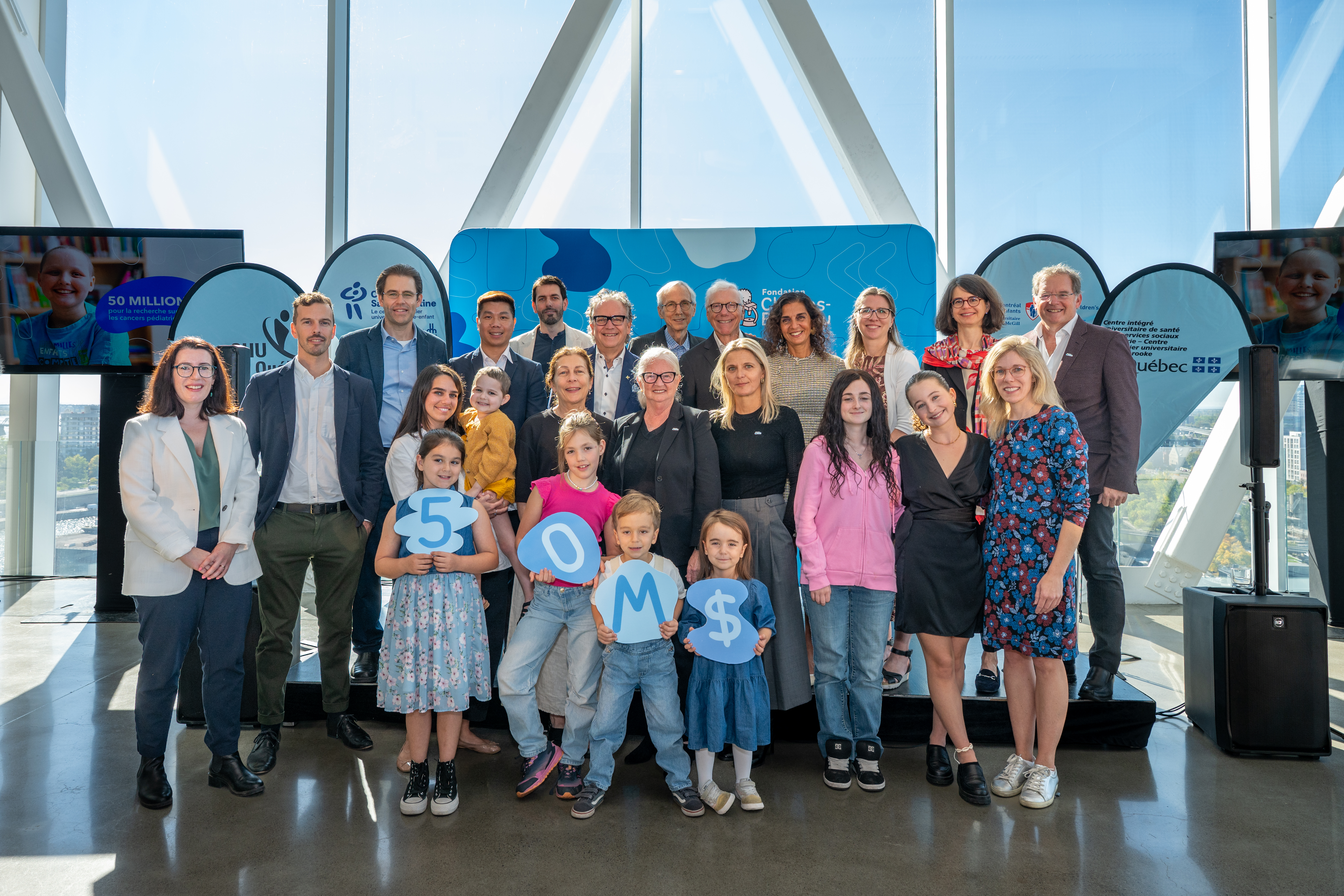$22 million to heal more children with cancer, better

The Charles-Bruneau Foundation makes the largest donation in the CHU Sainte-Justine’s history to support immuno-hemato-oncology research
Montreal, May 18, 2017 – The Charles-Bruneau Foundation has signed a historic agreement pledging $22 million to immuno-hemato-oncology research at the CHU Sainte-Justine, which will enable sequencing of the human genome in children and teenagers afflicted with cancer. This will help to understand the molecular characteristics of each individual tumour, provide a precise diagnosis, identify anomalies and provide treatment through targeted therapies. This strategic use of precision medicine paves the way for the discovery of biological markers of efficacy, genetic markers that, once detected, provide clues as to which treatment will be most effective and how the disease is likely to evolve, with the goal of improving quality of life after recovery, without side effects or complications. The Foundation’s exceptional commitment, which provides the means to develop individualized therapeutic treatments, was celebrated with great emotion today at the official inauguration of the Charles-Bruneau Immuno-Hemato-Oncology Research Unit at the CHU Sainte-Justine.
The CHU Sainte-Justine’s team of pediatric oncology researchers and clinicians is actively involved in major North American clinical research consortiums. The research program enabled by this donation will allow Sainte-Justine’s teams to consolidate their leadership and help determine, right here in Quebec, how best to treat and cure children with cancer. These funds enable the CHU Sainte-Justine to accelerate the pace of scientific discoveries, offer the most innovative treatments, and increase the speed of knowledge transfer across the entire health network, at both the national and international levels.
Identification of therapeutic response determinants
“First, a genomic study will allow us to examine all the genes, the entire genetic life of each patient, to identify the molecular bases of the child’s disease, define the potential resistance to treatment in the short- and long-term depending on the genetic profile, and identify any side effects of treatment in order to develop individualized therapeutic interventions, or precision medicine,” said Pr. Daniel Sinnett, Cancer Genetics Researcher, head of the Viral and Immune Disorders and Cancers Research Axis and co-head of the Immune Diseases and Cancer Area of Excellence.
Immunotherapy and targeted therapies
“If cancer develops in a child, it is because the immune system has failed to surround and destroy it. The second phase of treatment focuses on two new approaches based on a completely different system than that of conventional chemotherapy: immunotherapy and targeted therapies. The first uses the child’s immune system, their own defense system, and reprograms it through the genetic modification of cells, so that it can attack the cancerous cells the same way it would normally attack a virus,” said Dr. Elie Haddad, clinician in the Immunology and Allergy Clinic at the CHU Sainte-Justine and co-head of the Cancer and Immune Disorders Area of Excellence.
“The second approach, which works in concert with the first, focuses on targeted treatments according to the patient’s molecular profile, the goal of which is to destroy only the cancerous cells without damaging any of the body’s healthy cells, to prevent the child from experiencing aftereffects,” added Dr. Michel Duval, co-head of the CHU Sainte-Justine’s Hemato-Oncology Department.
Quality of life and psychosocial research
“How can we measure the distress a family feels when they receive a diagnosis, or their rising hope when there is good news? Quality of life is measurable,” said Mr. Serge Sultan, psychologist and researcher at the CHU Sainte-Justine.
“Patients are key players in the advancement of the quality of care and it is our duty to support the child, parents, grandparents and siblings through such a difficult time. Psychosocial research is our third weapon in the fight against cancer and the improvement of quality of life for children in Quebec,” said Dr. Michel Duval.
Medicine of tomorrow
“As a super-regional oncology centre, the CHU Sainte-Justine is responsible for the diagnosis and treatment of more than 60% of pediatric cancer cases in Quebec. The impact of these illnesses on the child, the creativity of our approaches, our success when it comes to therapies and the transdisciplinarity of our researchers form the basis of our scientific programming. We’re working on the medicine of tomorrow today, and it promises to be highly individualized. With personalized treatments that are better adapted to each case, therapies will be more effective, the chances of a cure are greater, the incidence of secondary effects is reduced, and we can also hope to reduce the impact on health care costs in the long term,” stated Dr. Fabrice Brunet, CEO of the CHU Sainte-Justine.
Ms. Maud Cohen, CEO of the CHU Sainte-Justine Foundation, was delighted to acknowledge the incredible pledge of $22 million from the Charles-Bruneau Foundation, which, through its commitment, engagement and desire for innovation, healing and improving the well-being of children with cancer, supports and highlights the interdisciplinary approach of the CHU Sainte-Justine’s immuno-hemato-oncology research team, as well as their partnership with patients and families.
“Today is a great day for pediatric oncology in Quebec. With this donation, the Charles-Bruneau Foundation has brought philanthropy to new heights to match the ambitions of the CHU Sainte-Justine. Thank you for inspiring hope for a healthy future. The CHU Sainte-Justine Foundation is proud to stand with the Charles-Bruneau Foundation in the fight against childhood cancer. This support will allow the CHU Sainte-Justine’s pediatric oncology researchers and clinicians to immediately undertake projects to ensure that children in Quebec have the first access to what will become the standard in health care in the next five years,” she said.
Charles’s lasting dream
“Before his death, Charles asked me to promise that I would continue his fight. At the time, I had no idea of the journey I was about to embark on, but that’s why today, 27 years after establishing the Foundation that bears his name, we remain committed to our mission with a donation of $22 million towards research. Our goals are to cure the 20% of children whose cancer is resistant to treatment, and to improve quality of life for children in remission so that they can achieve a total cure, without side effects or complications. I am convinced that one day, all children will see their dream of a cure come true,” said Mr. Pierre Bruneau, board member and spokesperson for the Charles-Bruneau Foundation.
“The Sainte-Justine team, in collaboration with its partners and using a network-based approach, is now expanding its research and teaching efforts in the field of pediatric oncology. Today, we know that more discoveries will be made in the next 10 years than in the last 100. We firmly believe that a partnership with such a renowned institution to create this immuno-hemato-oncology research unit will transform current treatments for pediatric cancer. Researchers will now be able to push the boundaries of knowledge even further and accelerate knowledge transfer from the laboratory to the patient’s bedside,” stated Rébecca Dumont, executive director of the Charles-Bruneau Foundation.
For the Charles-Bruneau Foundation, being able to contribute so generously to immuno-hemato-oncology research is a means of continuing the fight against pediatric cancer in Quebec and improving patients’ quality of life after treatment, a goal which is at the heart of its mission.
The CHU Sainte-Justine and the CHU Sainte-Justine Foundation gratefully acknowledge this historic support from the Charles-Bruneau Foundation, which enables the CHU Sainte-Justine’s teams to continue to heal more children, better.



